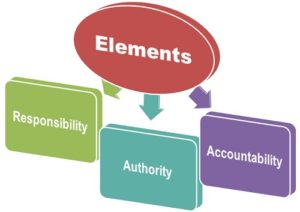Authority
Authority is defined as the right to give orders, supervise the work of others & make certain decisi -ons. It is linked with the managerial position to give orders & expect to follow the orders. In olden days, it was the basic element that made the organizations smoothly working. The authority was delegated from top to bottom of the organizational hierarchy.
Types of Authority in Management
- Line Authority
- Staff Authority
- Functional Authority
- Line Authority:-The work of an employee is directed with the help of line authority. It takes the form of employer-employee relationship that moves from top to bottom. Certain decisions are made by the line manager without consulting any other person.
- Staff Authority:-Staff authority is possessed by the staff managers. The objectives of the organization determine the line & staff nature of the functions of any manager. When the size of organization becomes larger & larger, the line mangers feel that they cannot complete their jobs by the existing skills, experience & knowledge which are not updated accordingly. Therefore staff authority is generated for the staff whose main purpose is to assist, support, advice & decrease the work burden of the line managers.
- Functional Authority:-Functional authority that is also known as functional control, and is included in the area of line & staff aspects of HRM as it is the special authority that is exercised by the personnel manager in coordinating the personnel activities. The HR manager here performs his functions as right arm of the supreme executive.
Delegation of Authority:- The Delegation of Authority is a process through which manager assigns responsibility to the subordinate with a certain level of authority, i.e. power to take decisions, in order to accomplish certain assignments on the manager’s behalf.
There are three major elements of delegation of authority

Features of Delegation of Authority
- Delegation means giving power to the subordinate to act independently but within the limits prescribed by the superior. Also, he must comply with the provisions of the organizational policy, rules, and regulations.
- Delegation does not mean that manager give up his authority, but certainly he shares some authority with the subordinate essential to complete the responsibility entrusted to him.
- Authority once delegated can be further expanded, or withdrawn by the superior depending on the situation.
- The manager cannot delegate the authority which he himself does not possess. Also, he can not delegate his full authority to a subordinate.
- The delegation of authority may be oral or written, and may be specific or general.
- The delegation is an art and must comply with all the fundamental rules of an organization.
